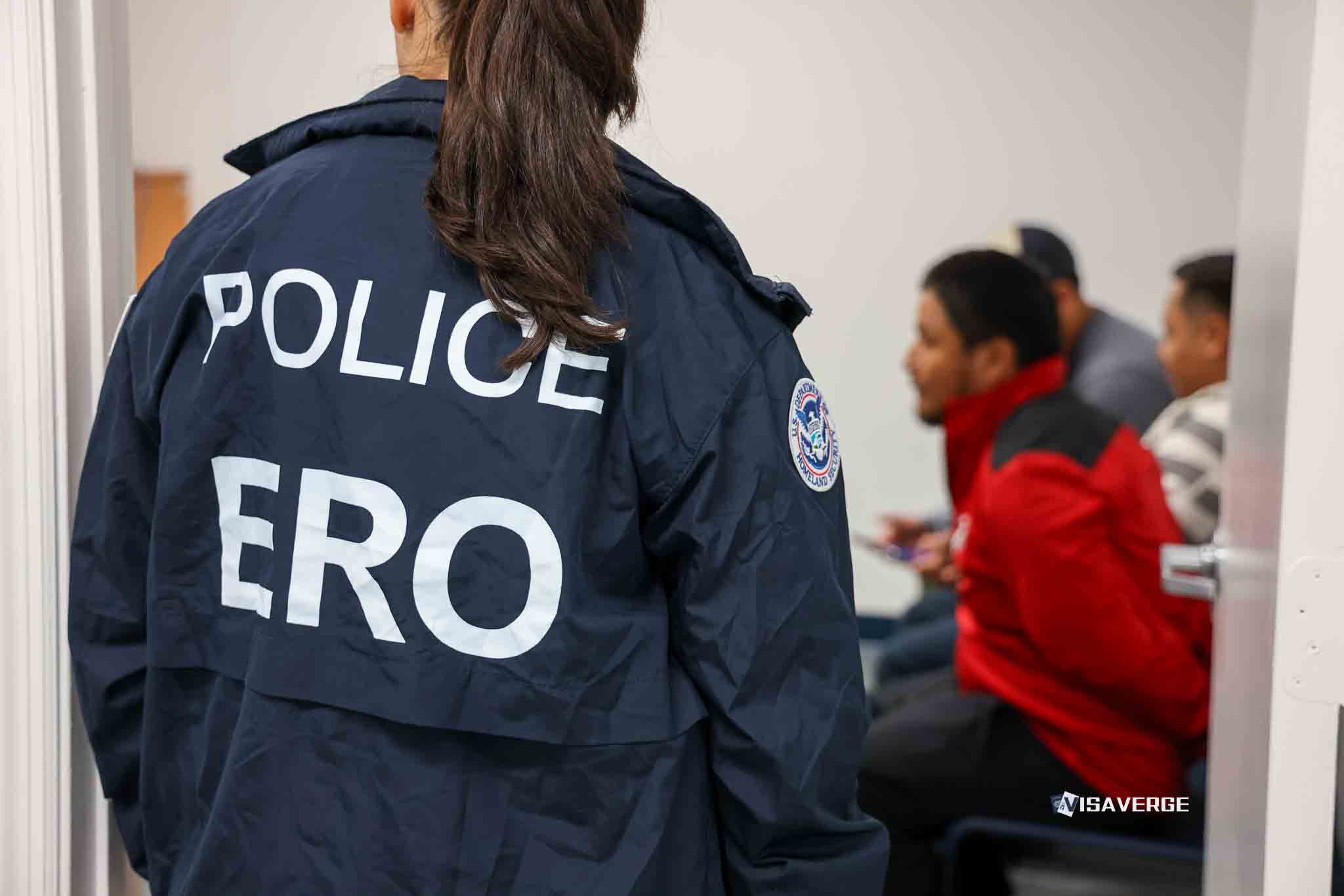Key Takeaways
• Aspari, an Iranian green card holder, has been detained by ICE since February 20, 2025, in Tacoma.
• His immigration hearing was postponed, prolonging detention over four months amid court backlogs and policy changes.
• ICE arrested 11 Iranians in 48 hours in June 2025; enforcement targets increase due to security concerns.
An Iranian green card holder named Aspari has been held in U.S. Immigration and Customs Enforcement (ICE) custody in Tacoma, Washington, since February 20, 2025. His case has drawn national attention after his immigration hearing was postponed, leaving him detained for over four months with no clear end in sight. This situation highlights ongoing problems in the U.S. immigration system, especially for lawful permanent residents facing removal proceedings. The case also reflects a broader crackdown on Iranian nationals and growing concerns about due process, court backlogs, and the rights of green card holders.
Who Is Involved and What Happened?

Aspari, an Iranian national who holds a green card (officially known as lawful permanent resident status), was detained by ICE in Tacoma, Washington. He has been in custody since February 20, 2025. His immigration hearing, which was supposed to determine whether he could remain in the United States 🇺🇸 or face removal, was recently postponed. This delay means Aspari remains in detention, even though green card holders usually have the right to live and work in the United States 🇺🇸.
The case is not unique. In the same 48-hour period in June 2025, ICE arrested at least 11 Iranian nationals as part of a broader enforcement push. These actions are part of a larger trend of increased ICE arrests and detentions, especially targeting people from certain countries like Iran 🇮🇷.
Why Was Aspari Detained?
ICE detains green card holders like Aspari when there are allegations of criminal activity, immigration violations, or national security concerns. While holding a green card gives someone the right to live and work in the United States 🇺🇸, it does not protect them from being detained or removed if they are accused of breaking certain laws or violating immigration rules.
In Aspari’s case, the specific reasons for his detention have not been made public. However, his continued detention after a postponed immigration hearing has raised questions about fairness, due process, and the treatment of lawful permanent residents.
The Bigger Picture: ICE Enforcement and Iranian Nationals
The detention of Aspari comes at a time when ICE is increasing its enforcement actions, especially against Iranian nationals. According to ICE data, 11 Iranians were arrested within 48 hours in June 2025. In the last fiscal year, ICE arrested 68 Iranian nationals, 47 of whom had criminal convictions.
ICE’s daily arrest numbers have also jumped sharply. During President Trump’s first 100 days in office, ICE averaged about 660 arrests per day. By June 2025, that number had nearly doubled to 1,200 daily arrests, with a stated goal of reaching 3,000 arrests per day. These numbers show a clear shift toward more aggressive enforcement, especially for people from countries considered to be security concerns.
Department of Homeland Security (DHS) Secretary Kristi Noem has publicly supported these actions, saying that proactive enforcement is necessary to protect national security, especially in light of recent tensions between the United States 🇺🇸 and Iran 🇮🇷.
How the Immigration Hearing Process Works
When ICE detains a green card holder, several steps follow:
- Detention: ICE takes the individual into custody, often based on suspected immigration violations or criminal charges.
- Notice to Appear (NTA): The detainee receives a Notice to Appear, which is the official document starting removal (deportation) proceedings. You can find more information about the Notice to Appear (Form I-862) on the official USCIS website.
- Immigration Hearing: The detainee appears before an immigration judge. This hearing is where the person can contest removal or ask for relief, such as asylum or cancellation of removal.
- Hearing Postponement: If the hearing is delayed or postponed, the detainee usually remains in custody unless they are granted bond or released for another reason.
- Judge’s Decision: The judge decides whether the person should be removed from the United States 🇺🇸 or allowed to stay. If the decision is negative, the detainee can appeal.
- Release or Removal: Depending on the outcome, the person is either released, remains in detention, or is removed from the country.
In Aspari’s situation, the postponement of his immigration hearing has left him in legal limbo, with no clear timeline for resolution.
Why Are Immigration Hearings Delayed?
Immigration courts in the United States 🇺🇸 are facing a massive backlog. The number of cases has grown rapidly in recent years, partly because of increased ICE arrests and limited resources for immigration courts. When hearings are delayed, people like Aspari can spend months—or even years—in detention while waiting for their cases to be heard.
Delays can happen for many reasons:
- Not enough immigration judges to handle the volume of cases
- Scheduling conflicts or administrative problems
- Requests for more time by lawyers or the government
- Sudden increases in enforcement actions, leading to more cases than the courts can handle
These delays are not just inconvenient—they can have serious effects on people’s lives, especially for those separated from their families and legal support.
The Impact on Green Card Holders
Green card holders, also known as lawful permanent residents, usually have strong protections under U.S. law. However, they can still be detained and removed if they are accused of certain crimes or immigration violations.
Key facts about green card holders and detention:
- Lawful permanent resident status allows someone to live and work in the United States 🇺🇸, but it is not absolute. Certain criminal convictions or immigration violations can lead to removal proceedings.
- Detention during removal proceedings is common if ICE believes the person is a flight risk or a danger to the community.
- Prolonged detention can make it harder for green card holders to prepare their defense, especially if they are held far from their families or lawyers.
As reported by VisaVerge.com, the detention of green card holders like Aspari has sparked concern among advocacy groups and legal experts, who argue that these practices can violate basic rights and due process.
Legal and Policy Context
The Trump administration’s immigration policies, which continue to influence enforcement in 2025, have focused on aggressive detention and removal, even for lawful permanent residents. These policies have led to more arrests, longer detentions, and a greater focus on people from countries like Iran 🇮🇷.
DHS Secretary Kristi Noem has emphasized the need for strong enforcement, especially in light of recent U.S. military actions against Iranian nuclear facilities and the resulting security concerns. The Department of Homeland Security has also activated the National Terrorism Advisory System, which has contributed to increased scrutiny of Iranian nationals.
Advocacy groups and some legal experts argue that these policies go too far, especially when they lead to the prolonged detention of people who have lived in the United States 🇺🇸 for years and have strong ties to the community.
Due Process and Constitutional Concerns
Legal experts warn that holding green card holders for long periods without a timely immigration hearing can violate their constitutional rights. The U.S. Constitution guarantees due process, which means the government must follow fair procedures before depriving someone of their liberty or property.
Concerns raised by legal experts and advocates include:
- Prolonged detention without a hearing can be seen as punishment without trial.
- Limited access to legal counsel makes it harder for detainees to defend themselves.
- Separation from family causes emotional and financial hardship.
- Uncertainty and fear in immigrant communities, especially among people from targeted countries.
Some immigration judges and legal scholars have called for more resources to reduce court backlogs and ensure that hearings happen quickly and fairly.
Community and Advocacy Response
In Washington state, local advocacy groups and community organizations have spoken out about Aspari’s case and others like it. They argue that holding green card holders for months without a hearing is unfair and harmful, both to the individuals involved and to their families.
These groups often provide legal support, help detainees connect with lawyers, and advocate for policy changes to reduce detention times and improve due process protections.
The Broader Trend: Geopolitics and Immigration Enforcement
The increased enforcement against Iranian nationals is not happening in a vacuum. It is closely tied to recent geopolitical tensions between the United States 🇺🇸 and Iran 🇮🇷. After U.S. strikes on Iranian nuclear facilities, the U.S. government has heightened its focus on national security, leading to more arrests and detentions of people from Iran 🇮🇷.
This trend has created a climate of fear and uncertainty for Iranian immigrants and green card holders in the United States 🇺🇸. Many worry that they could be targeted for detention or removal, even if they have lived in the country for years and have not committed any crimes.
What Can Detained Green Card Holders Do?
If you or someone you know is a green card holder detained by ICE, here are the basic steps to follow:
- Contact a lawyer as soon as possible. Legal representation can make a big difference in removal proceedings.
- Check the status of the case using the ICE Detainee Locator to find information about the detainee’s location and status.
- Prepare for the immigration hearing. Gather documents, evidence, and witness statements that support your case.
- Request a bond hearing if eligible. Some detainees can ask the judge for release on bond while their case is pending.
- Stay informed about court dates and deadlines. Missing a hearing can have serious consequences.
Local legal aid organizations and immigrant advocacy groups can also provide support and guidance.
The Future: What’s Next for Immigration Hearings and Detention?
Looking ahead, several factors will shape the future of immigration detention and hearings for green card holders:
- Court backlogs are likely to continue unless Congress provides more funding for immigration judges and court staff.
- ICE enforcement targeting Iranian nationals may remain high as long as security concerns persist.
- Legal challenges and advocacy efforts could lead to reforms that reduce detention times and strengthen due process protections.
- Policy changes under future administrations could shift the focus of enforcement and detention practices.
Official Resources and Where to Get Help
If you need more information or help with an immigration case, here are some official resources:
- ICE Enforcement and Removal Operations: Find detention facility locations and detainee information on the ICE website.
- Executive Office for Immigration Review (EOIR): Manages immigration courts and hearing schedules. Visit the EOIR website for more details.
- Department of Homeland Security (DHS): Oversees ICE and sets immigration enforcement policies. The DHS website has policy updates and contact information.
- Legal aid organizations: Many states, including Washington, have groups that offer free or low-cost legal help to immigrants and detainees.
Takeaways and Practical Guidance
The case of Aspari, an Iranian green card holder stuck in ICE custody after a postponed immigration hearing, shows the real-life impact of immigration enforcement policies and court delays. Green card holders are not immune from detention or removal, especially if they are accused of crimes or immigration violations. Delays in immigration hearings can keep people in detention for months, causing hardship for them and their families.
If you are a green card holder facing detention, it is important to:
- Seek legal help immediately
- Stay informed about your rights and court dates
- Reach out to advocacy groups for support
For more information about your rights as a green card holder and the immigration hearing process, visit the U.S. Citizenship and Immigration Services (USCIS) Green Card page.
Analysis from VisaVerge.com suggests that unless there are major changes in policy or resources, cases like Aspari’s will likely continue. Advocates and legal experts are calling for reforms to ensure that lawful permanent residents receive fair treatment and timely hearings.
Staying informed and prepared is the best way to protect your rights and navigate the complex immigration system during these challenging times.
Learn Today
Green Card → Legal status allowing non-citizens to live and work permanently in the United States.
ICE → U.S. Immigration and Customs Enforcement, the agency responsible for immigration enforcement and detention.
Notice to Appear (NTA) → Official document initiating removal proceedings against an individual in immigration court.
Lawful Permanent Resident → A person authorized to live permanently in the United States but subject to immigration laws.
Due Process → Legal requirement that the government respects all legal rights owed to a person.
This Article in a Nutshell
Aspari’s prolonged detention highlights ICE’s intensified enforcement against Iranian green card holders amid court delays and security fears. Legal experts warn of due process violations. Advocacy groups call for reforms. Detention without timely hearings causes hardship and uncertainty for green card holders facing removal proceedings in the United States.
— By VisaVerge.com













